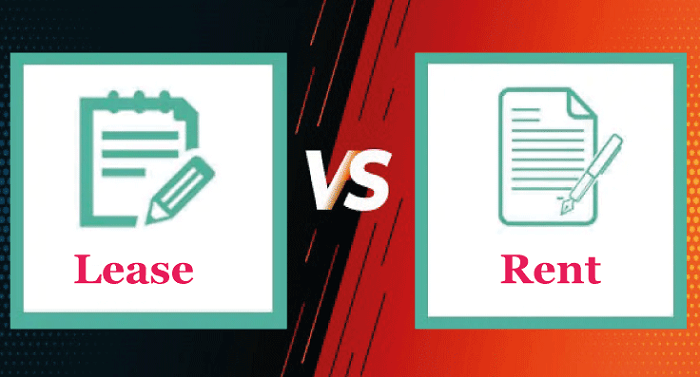Difference Between Lease and RentLease and rent are two terms commonly used terms in the real estate industry. They describe the process of occupying a property for a certain period of time. While both terms are often used interchangeably, they actually have distinct differences. Thus making it important to understand for both tenants and landlords. 
Lease vs. Rent: What's the Difference?In simple terms, a lease is a contractual agreement between a landlord and tenant that outlines the terms of occupancy for a specific period of time. A rent, on the other hand, is the amount of money paid by the tenant to the landlord for the right to occupy the property for a certain period of time. While these two terms are closely related, they are not the same thing. LeaseA lease is a binding legal agreement between a landlord and tenant that typically lasts for a set period of time, such as six months or a year. During this time, the tenant is responsible for paying rent and following the terms of the lease agreement, which may include restrictions on the use of the property, the number of occupants allowed, and other conditions. One of the most significant differences between a lease and rent is that a lease typically provides more stability and predictability for both the tenant and the landlord. Because a lease lasts for a specific period of time, the landlord can count on a certain amount of income from the tenant for that period, and the tenant can plan on living in the property for the duration of the lease without worrying about sudden rent increases or eviction. Another key feature of a lease is that it often includes specific terms and conditions that the tenant must follow, such as restrictions on subletting or pets. These terms are typically negotiated between the landlord and tenant and are legally binding for the duration of the lease. If the tenant violates any of these terms, the landlord may have the right to terminate the lease early or take legal action against the tenant. RentRent, on the other hand, refers to the amount of money paid by the tenant to the landlord in exchange for the right to occupy the property. Rent payments are typically made on a monthly basis and are often subject to change depending on a variety of factors, such as market conditions, the landlord's expenses, and the tenant's behavior. One of the key differences between rent and a lease is that rent payments can be subject to change, while the terms of a lease are typically fixed for the duration of the lease. For example, if the landlord decides to increase the rent, the tenant may have the option to either accept the new terms or move out at the end of the current lease period. Another difference between rent and a lease is that the landlord typically has more control over the property when renting. While the tenant is still responsible for keeping the property clean and in good condition, the landlord may have the right to make certain changes to the property or enter the property for inspections or repairs without the tenant's consent. Lease vs. Rent: Pros and Cons For TenantsTenants who are trying to decide between a lease and rent should consider the pros and cons of each option carefully before making a decision. Pros of a Lease
Cons of a Lease
Pros of Rent
Cons of Rent
Lease vs. Rent: Pros and Cons for LandlordsLandlords who are deciding between a lease and rent should also consider the pros and cons of each option carefully. Pros of a Lease
Cons of a Lease
Pros of Rent
Cons of Rent
Lease vs. Rent: Which is Better for You?Ultimately, the decision between a lease and rent will depend on your individual circumstances and preferences. If you are looking for a more stable living situation and can afford potentially higher upfront costs, a lease may be a better fit for you. On the other hand, if you need more flexibility or have limited funds available upfront, rent may be a better option. It's important to carefully consider the pros and cons of each option, as well as your specific needs and priorities, before making a decision. Additionally, it's always a good idea to thoroughly review any lease or rental agreement before signing, to ensure that you fully understand the terms and conditions of your tenancy. Regardless of whether you choose a lease or rent, it's important to maintain a good relationship with your landlord or property manager. Also, always communicate openly and honestly with them. This can help to prevent potential conflicts or disputes, and can help to ensure a positive renting experience for both you and your landlord.
Next TopicDifference between
|
 For Videos Join Our Youtube Channel: Join Now
For Videos Join Our Youtube Channel: Join Now
Feedback
- Send your Feedback to [email protected]
Help Others, Please Share









